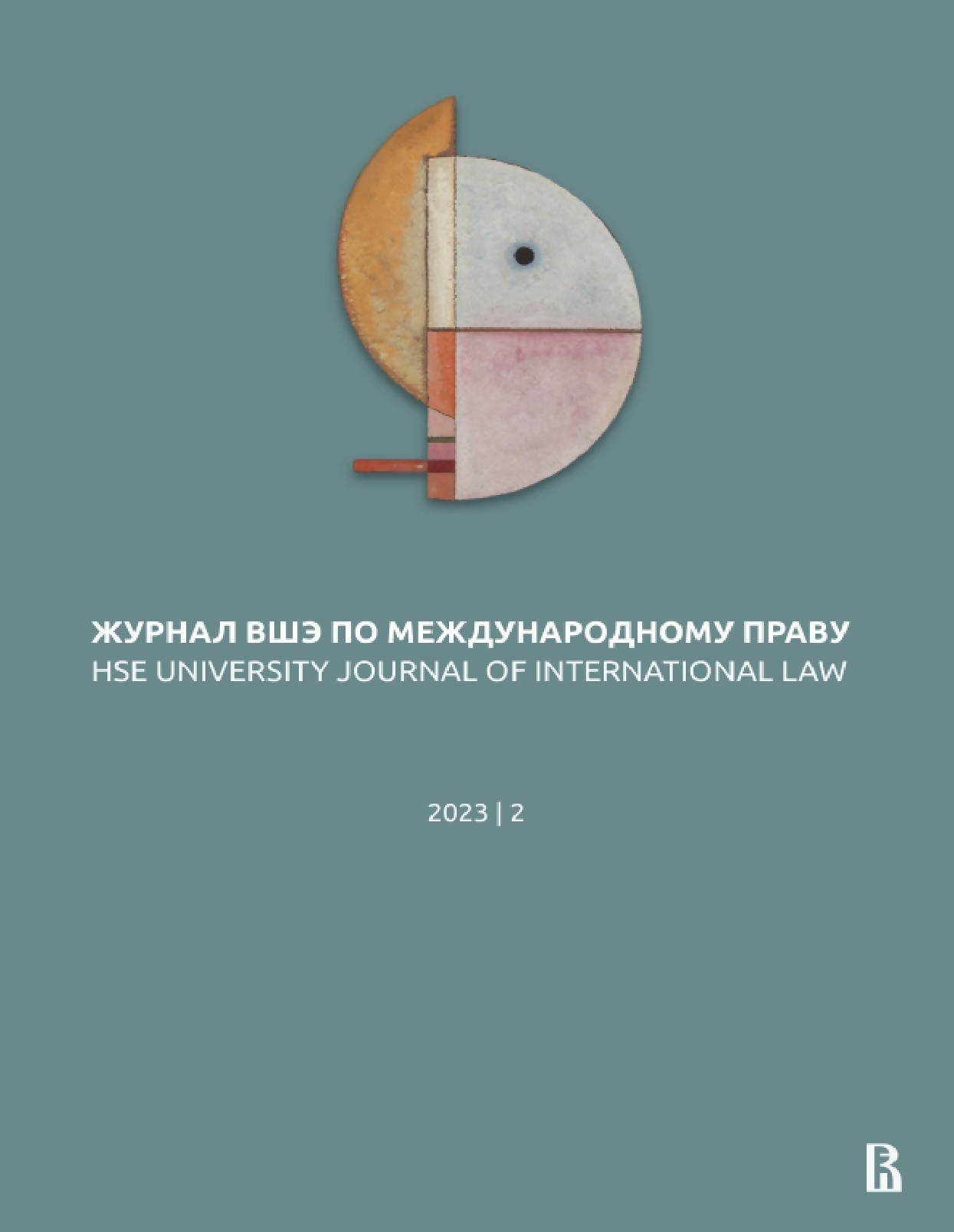International Legal Problems of Establishing a Genuine Link between the Ship and the Flag State: the Triumph of Formalism over Content?
Abstract
The article examines the evolution of an international legal norm that establishes the requirement to ensure a genuine link between a ship and the Flag State. It is a question of exactly what actions the Flag State should take to properly exercise jurisdiction and control on the ship. In particular, the list of measures that are to be taken by the Flag State to ensure effective exercise of its jurisdiction and control over ships fl ying its flag in administrative, technical and social matters is only indicative, not exhaustive. The author notes that the problems of establishing a genuine link are relevant not only in the context of ships, but also artificial installations and structures, and in an even broader context, they relate to the institution of citizenship of individuals. The author conducts a comparative legal analysis of the institutions of citizenship of individuals and the natio nality of ships. While the granting of citizenship to a person depends on the legal fact of birth (filiation) or compliance with a formal procedure defined by law (naturalisation), the relationship between the state and an individual also has some moral component (mutual sense of duty, loyalty). A ship, b eing an immovable thing (res), also has a nationality, but the relationship between such a thing and the state is based on a functional approach. Nevertheless, the similarity of these two categories in modern conditions can be traced: the sale by states of their nationality to foreign citizens (the so -called “investment citizenship”) brings the essence of this institution closer to some marketability traditionally inherent in the nationality of ships (registration of a vessel in offshore (open) registers and the acquisition of a “flag of convenience”).
As a result of the study of the practice of granting nationality to ships, the author identified two trends. According to one trend, for the lawful acquisition of the right to the flag, only the fact of registration of the vessel in the register of the Flag State is sufficient. Various estimates show that in the world about 35 states of open registration provide (sell) a “convenient flag”. Another trend is that in addition to the formal entry into the register, a number of conditions are required to ensure some kind of actual relations between the state and the vessel (a genuine link). The second trend is considered by the author as preferable. The general conclusion is made about the need to assess how strict requirements are imposed on shipowners at the level of the national legislation of the Flag State, including in such matters as ownership, citizenship of shipowners, captain and crew members, accountability, transparency, etc.
Downloads
References
Abgaryan D. R. (2015) Praktika mezhdunarodnogo tribunala po morskomu pravu [The practice of International Tribunal for the Law of the Sea], Moscow: YUsticinform. (In Russian).
Bekyashev K. A. (2014) Suda pod udobnymi flagami podryvayut osnovy ratsional'nogo ispol'zovaniya vodnyh biologicheskih resursov [Vessels flying «flags of convenience» undermine the rational use of marine bio-resources]. Mezhdunarodnoe morskoe pravo. Stat'i pamyati A.L. Kolodkina, Moscow: Statut. (In Russian).
Bettinck W. (1987) Open Registry, the Genuine Link and the 1986 Convention on Registration Conditions for Ships. Netherlands Yearbook of International Law, vol. 18, pp. 69–119. https://doi.org/10.1017/s0167676800001689
Boczek A. (1962) Flag of Convenience. International Legal Study. Harvard University Press. https://doi.org/10.4159/harvard.9780674188396
Brian B. (2012) Flags of Convenience and the Gulf Oil Spill: Problems and Proposed Solutions. Houston Journal of International Law, vol. 3, pp. 687–695.
Brounli I. (1977) Mezhdunarodnoe pravo (v dvuh knigah), kniga vtoraya [International Law (in two volumes), vol. 2], Moscow: Izdatel'stvo «Progress». (In Russian).
Dipla H. (2006). The role of the ICJ and the ITLOS in the progressive development of the law of the sea. In: Strati A., Gavouneli M., Skourtos N. (eds.) Unresolved Issues and New Challenges to the Law of the Sea, Brill. https://doi.org/10.1163/ej.9789004151918.i-356.74
Gauci M., Aquilina K. (2017) The Legal Fiction of a Genuine Link as a Requirement for the Grant of Nationality to Ships and Humans – the Triumph of Formality over Substance? International and Comparative Law Review, vol. 1, pp. 167–191. https://doi.org/10.2478/iclr-2018-0007
Kolodkin A. L. (1962) Natsional'nost' morskogo sudna i princip real'noy svyazi [Nationality of the ship and the genuine link principle]. Sovetskiy ezhegodnik mezhdunarodnogo prava, Izd-vo AN SSSR, pp. 227–240. (In Russian).
Kolodkin A. L., Guculyak V. N., Bobrova Yu. V. (2007) Mirovoy okean. Mezhdunarodno-pravovoy rezhim: osnovnye problemy [World Ocean. International Legal Regime: Main Problems], Moscow: Statut. (In Russian). https://doi.org/10.24833/0869-0049-2009-1-275-278
Martens F. F. (2008) Sovremennoe mezhdunarodnoe pravo tsivilizovannyh narodov. V 2-h tomah [Modern International Law of Civilized Nations], Moscow: Zertsalo. (In Russian).
Proelss A. (ed.) (2017) United Nations Convention on the Law of the Sea: A Commentary, C. H. Beck, Hart, Nomos. https://doi.org/10.1163/22116133-02701047
Sloane R. (2009) Breaking the Genuine Link: The Contemporary International Legal Regulation of Nationality. Harvard International Law Journal, vol. 50, no. 1, pp. 1–60.
Tunkin G. I. (1962) Ocherki mezhdunarodnogo morskogo prava [Essays of the International Law of the Sea], Moscow: Gosudarstvennoe izdatel'stvo yuridicheskoy literatury. (In Russian).
Walker G. (2012) Definitions for the Law of the Sea. Terms Not Defined by the 1982 Convention, Brill. https://doi.org/10.1163/9789004211612_005
This work is licensed under CC BY-NC-ND 4.0


